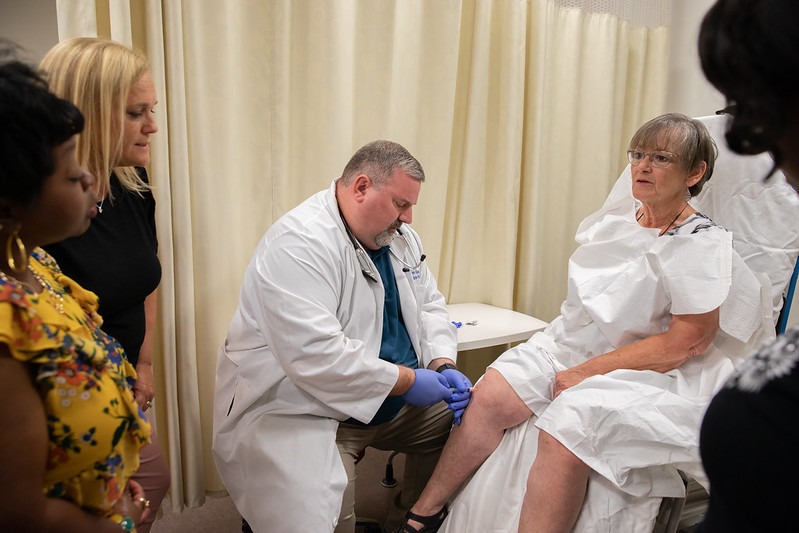Nursing is more than a career—it’s a calling. And for those who feel drawn to teach the next generation of nurses, becoming a nurse educator opens a door to long-term impact in clinical settings, classrooms and beyond. If you’re exploring how to become a nurse educator, you’re likely already thinking about how to blend your experience with the power of education.
Rowan University offers a focused path for current nurses ready to take that step through its MSN Nurse Educator program, part of our respected master’s in nursing education offerings.

What Is a Nurse Educator?
A nurse educator is both a teacher and a mentor. These professionals work in colleges, universities, teaching hospitals and healthcare organizations to educate nursing students, new nurses and even experienced staff. They design curriculum, lead clinical training and help shape policy through evidence-based education.
This is a vital role at a time when the U.S. is facing a critical shortage of qualified nursing faculty. According to the American Association of Colleges of Nursing, over 80,000 qualified applicants were turned away from nursing schools in a recent year due to a lack of instructors.
That’s where you come in.
Why Consider a Master’s in Nursing Education?
Earning a master’s in nursing education prepares you to teach, inspire and lead with authority. It’s more than a credential—it’s the foundation of an academic and professional career that elevates both the nurse and the nursing profession.
Through Rowan’s MSN Nurse Educator program, students build skills in curriculum development, learning theory, evaluation methods and clinical teaching strategies. You’ll also gain hands-on teaching experience and collaborate with faculty experts dedicated to developing tomorrow’s leaders.
Graduates go on to roles such as:
- Clinical nurse educator
- Nursing faculty at universities and colleges
- Professional development coordinator
- Simulation lab instructor
How to Become a Nurse Educator
If you’re wondering how to become a nurse educator, here are the 5 key steps:
- Earn your BSN: This is the foundational degree for all advanced nursing roles.
- Gain clinical experience: Most roles require 2+ years of real-world nursing experience.
- Pursue a master’s in nursing education: A graduate degree is typically required to teach at the collegiate level.
- Complete a practicum: Programs like Rowan’s MSN Nurse Educator include hands-on teaching practice.
- Consider certification: While not required, the CNE (Certified Nurse Educator) credential adds value and recognition.
Each step is designed to build your confidence as both a clinician and an instructor. And with Rowan’s expert support, you don’t navigate the journey alone.

Career Outlook and Salary Expectations for Nurse Educators
The demand for nurse educators is growing. The U.S. Bureau of Labor Statistics reports that nursing instructors and teachers at the postsecondary level earn a median salary of $84,180, with top earners making over $130,000 annually.
In addition to salary, many educators enjoy regular hours, academic breaks and the satisfaction of shaping future generations of caregivers. With high job stability and a clear path for advancement, this role offers professional growth with purpose.
Start Your Journey to Become a Nurse Educator with Rowan
Rowan University is a nationally recognized, top 100 public research university committed to access, affordability and academic excellence. If you’re ready to lead in both practice and education, our MSN Nurse Educator track can help you get there. With online learning, flexible curriculum and expert faculty, Rowan supports your goals every step of the way.
Whether you’re still exploring how to become a nurse educator or you know you’re ready to apply, we invite you to take the next step. Discover how a master’s in nursing education can unlock opportunities to influence, teach and lead.
Interested in learning more first?
Check out these related blogs to explore further the benefits of an online master’s degree in nursing in the profession:
- A Guide: The Best Masters’ Degrees for Nurses – Discover why more nurses are pursuing MSN programs and explore the best master’s degrees for nurses, from top specializations to online learning options.
- How Long Does It Take to Get a Master’s in Nursing? – Understand how long it takes to get a master’s in nursing, what affects your timeline, and how online MSN programs support your nursing career goals.
These resources will help you make an informed decision about your educational path and next steps within the nursing field.

